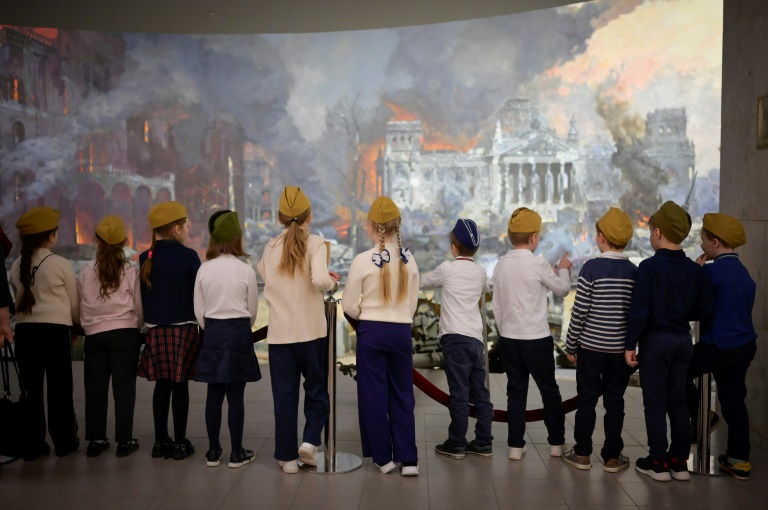“I've seen a real machine gun!” 11-year-old Savely beamed with excitement outside Moscow's Patriotic Victory Museum.
The child standing under the gray skies of Moscow with his younger brother and mother Alina was well versed in weaponry.
“I'm really interested in all this. I know about old German weapons and Soviet weapons,” he said.
The family visited the museum ahead of the Victory Day holiday. Russia has always marked this day with gaiety, but the prolonged attack on Ukraine has added to the patriotism.
The museum commemorates the Soviet Union's victory over Nazi Germany in World War II, which claimed the lives of approximately 30 million Soviets.
Known in Russia as the Great Patriotic War, it is a source of immense pride for the country and an essential pillar of the fervent military patriotism that Russia promotes. President Vladimir Putin During the quarter century of his administration.
The Kremlin marshals this historical narrative to justify its attack on Ukraine, positioning the military operation as an existential struggle against “neo-Nazis.”
Now, as troops fight in Ukraine, that message has become an increasingly important part of how Russia's young children are raised.
Outside the museum, Savery was holding a wooden rifle that was almost as tall as him. He had requested it as a birthday present the day before.
Like many Muscovites, the family was visiting ahead of Victory Day celebrations on May 9. This is a public holiday in which Russia commemorates military victories with a grand parade of tanks, weapons, missiles, and soldiers on Moscow's Red Square.
“Both of my grandfathers served in the war,” said Alina, 36, who declined to give her last name.
She said this is not the first time she has brought her two sons for a visit.
“We came… to honor the memory of our ancestors and to see 'trophy' equipment,” he said, referring to an exhibition of NATO military equipment captured from the battlefields of Ukraine.
– 'I am a soldier' -
Inside the imposing white building, several classes of elementary school students filed out wearing military caps and orange and black St. George's ribbons, a symbol of the Red Army's 1945 victory.
The children listened intently to the guide's story.
“Kiev was recaptured in November 1943, and in May 1945 the military acted to liberate Berlin from the Nazis,” she said.
Behind her was a huge mural depicting the occupation of the Reichstag by Soviet troops.
The 7-year-olds shouted “Hurrah” in unison and hustled with each other to take pictures in front of the model tanks.
“I'm a soldier,” said one boy.
Further on, the walls of the magnificent Hall of Glory are inscribed with the names of hundreds of fallen soldiers.
“Without a past, there is no future,” the homage reads.
Since sending troops to Ukraine, the Kremlin has become more prominent in official historical narratives in school classes and official textbooks.
The annual federal budget allocated to so-called “patriotic education” soared 14 times to 50 billion rubles ($540 million) between 2021 and 2024.
– “Our History” –
Alexander Soskov, 69, visited the museum on Wednesday with his daughter Polina and two grandchildren.
“This is our history. It's in our blood,” he told AFP.
Like the Kremlin, he sees similarities with Russia's current fight in Ukraine.
“We don't have a conflict with Ukraine. We have a conflict with the fascists in Ukraine,” he said.
The Kremlin's claims that it is fighting to “denazify” Ukraine have been repeatedly rejected by Kiev, the West, and even independent historians and analysts.
Soskov's 8-year-old granddaughter, Daria, listened carefully. She said she studied about the Siege of Leningrad in school.
For many Russians, including Russian President Vladimir Putin, the siege of Leningrad (now St. Petersburg) is the central event of Russia's sacrifices on the domestic front.
During the 872-day German siege, more than 800,000 people died from starvation, disease, and shelling.
Not far away, six-year-old Igor was visiting a museum with his mother, Marina.
Igor enthusiastically agreed with his mother calling him a “patriot” and declared: “Russia is free!”
On Thursday morning, the two will watch as Putin oversees a military parade on Red Square.
At the inauguration ceremony for his next term in the Kremlin earlier this week, Putin said his mission was to “educate the younger generation who will strengthen Russia's power.”
The young Savery held a wooden gun and said he was ready to defend his “motherland.”
“I was born here and have lived here for a long time. I don't want to leave here,” said the 11-year-old boy.
Even if it means taking up real weapons?
“yes.”
Bar/BC


